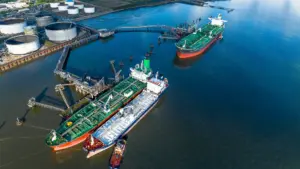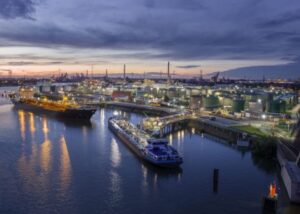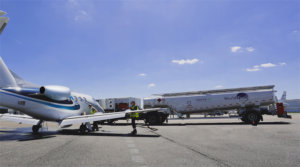
BP has announced that the first cargo of liquefied natural gas (LNG) produced by the new third liquefaction train at the Tangguh LNG facility, in Papua Barat, Indonesia, has safely been loaded and sailed, to be delivered to Indonesia’s state-owned power generator PT PLN (Persero). This marks the start of full commercial operation of the expanded Tangguh LNG facility.
Tangguh Train 3 adds 3.8 million tonnes per annum (mtpa) of LNG production capacity, bringing total plant capacity to 11.4mtpa. The first cargo of LNG produced by the new train sailed from Tangguh on 18 October to be delivered to PLN’s regasification facility in Arun, Nanggroe Aceh Darussalam province, Indonesia.
Dwi Soetjipto, chairman of SKK Migas, Indonesia’s oil and gas regulatory agency, says: ‘With its expanded production capacity, the Tangguh facility will play a vital role in helping to meet Indonesia’s growing energy demand, total gas production at Tangguh is expected to account for over a third of national gas production. Tangguh is the largest LNG producer in Indonesia and the production from Tangguh’s three-train operation will significantly contribute to the national gas production target of 12 bscf/d by 2030.’
Read more: Asia’s Outlook for LNG
In addition to the new train, the Tangguh expansion project included the construction of two offshore platforms, 13 new production wells, an LNG loading facility, and supporting infrastructure. At its peak, more than 13,500 workers were involved in the project’s development at the remote site, with a total of more than 155 million workhours spent to complete the project. Anja-Isabel Dotzenrath, BP’s EVP, gas and low carbon energy says: ‘The safe and successful start-up of Train 3 marks a new phase for Tangguh and is a proud day for BP and our Tangguh partners. I would like to thank the Government of Indonesia for our strong partnership and their continued support that has made this possible.’
‘Tangguh is important both to BP and to Indonesia. It is expected to account for more than a third of the country’s gas production and make a significant contribution to meeting the country’s growing needs for reliable and affordable energy. For BP, building our gas and LNG business is central to our strategy as we transform to an integrated energy company, investing in today’s hydrocarbon energy system as well as growing new lower carbon businesses,’ Dotzenrath continues.
The Tangguh expansion is the third major project start-up for BP globally in 2023, following start of production from the Mad Dog II project in the US Gulf of Mexico and from the MJ field off the east coast of India. Since beginning operations in 2009, Tangguh has worked to create positive social and economic impacts through comprehensive community development programmes. Train 3 will further enhance this, with a portion of the gas committed for electrification in Papua Barat, and the project aims to continue to increase the proportion of Papuans in Tangguh’s workforce from 73% today to meet its commitment of 85% by 2029.










